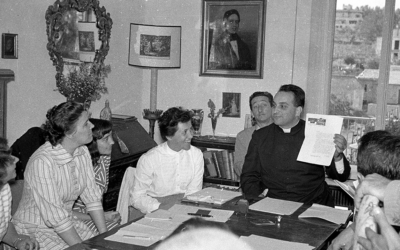 “We the people of the world do herewith declare our interdependence as individuals and members of distinct communities and nations. We do pledge ourselves citizens of one CivWorld …” Just a few yards from Philadelphia’s Independence Hall which witnessed the signing of the Declaration of Independence, in the historic Benjamin Franklin Hall of the American Philosophical Society, 350 noted figures in politics, business, academia and the arts gathered to inaugurate the first annual “Interdependence Day.” Sponsored by the CivWorld Citizens Campaign for Democracy at the University of Maryland, the initial idea for Interdependence Day was rooted in the conviction that citizens themselves can be agents for building a more democratic society. Benjamin R. Barber, Professor of Civil Society at the University of Maryland, and fomer presidential advisor, played a key role in organizing the event aimed at focusing attention on the importance of passing from an attitude of ‘independence’ to one of ‘interdependence’ on the local and global level. To open the event, well-known personalities helped to capture the essence of the project. The message from United Nations’ Secretary-General Kofi Annan noted that the Declaration of Interdependence is similar to the beginning of the UN Charter, “We the peoples.” He defined the current challenge as moving towards a process in which decisions are taken no longer by single nations alone, but together. The message from former Czech President Vaclav Havel warmly encouraged all to develop “new networks of commitment to the common good”—to build up an interdependent world on the basis of responsibility and solidarity. Focolare founder Chiara Lubich was also present through a message which conveyed a powerful challenge to build a truly interdependent world by focusing on that third element which is often forgotten in political theory and practice: “Without fraternity, no person and no people is truly free and equal.” She encouraged, “doesn’t the name itself of the city you are in—Philadelphia—evoke a program of brotherly love? Brotherhood can give new meaning today to the reality of interdependence”. Then, beneath the watchful gaze of the classic portraits of Washington, Jefferson, and Franklin, lively exchanges and artistic presentations all expressed the profound reality of our interdependent world, and the commitment to work towards creating positive alternatives to war and violence. From the participants’ responses, and from the fact that Interdependence Day’s initial spark already enkindled parallel celebrations in Budapest, Hungary, and on several college campuses throughout the United States, it is clear that the time is ripe for the step ahead, from independence to interdependence. Plans are already underway for Interdependence Day 2004 – possibly in Rome, Calcutta, Johannesburg, Beijing, and many other global cities!
“We the people of the world do herewith declare our interdependence as individuals and members of distinct communities and nations. We do pledge ourselves citizens of one CivWorld …” Just a few yards from Philadelphia’s Independence Hall which witnessed the signing of the Declaration of Independence, in the historic Benjamin Franklin Hall of the American Philosophical Society, 350 noted figures in politics, business, academia and the arts gathered to inaugurate the first annual “Interdependence Day.” Sponsored by the CivWorld Citizens Campaign for Democracy at the University of Maryland, the initial idea for Interdependence Day was rooted in the conviction that citizens themselves can be agents for building a more democratic society. Benjamin R. Barber, Professor of Civil Society at the University of Maryland, and fomer presidential advisor, played a key role in organizing the event aimed at focusing attention on the importance of passing from an attitude of ‘independence’ to one of ‘interdependence’ on the local and global level. To open the event, well-known personalities helped to capture the essence of the project. The message from United Nations’ Secretary-General Kofi Annan noted that the Declaration of Interdependence is similar to the beginning of the UN Charter, “We the peoples.” He defined the current challenge as moving towards a process in which decisions are taken no longer by single nations alone, but together. The message from former Czech President Vaclav Havel warmly encouraged all to develop “new networks of commitment to the common good”—to build up an interdependent world on the basis of responsibility and solidarity. Focolare founder Chiara Lubich was also present through a message which conveyed a powerful challenge to build a truly interdependent world by focusing on that third element which is often forgotten in political theory and practice: “Without fraternity, no person and no people is truly free and equal.” She encouraged, “doesn’t the name itself of the city you are in—Philadelphia—evoke a program of brotherly love? Brotherhood can give new meaning today to the reality of interdependence”. Then, beneath the watchful gaze of the classic portraits of Washington, Jefferson, and Franklin, lively exchanges and artistic presentations all expressed the profound reality of our interdependent world, and the commitment to work towards creating positive alternatives to war and violence. From the participants’ responses, and from the fact that Interdependence Day’s initial spark already enkindled parallel celebrations in Budapest, Hungary, and on several college campuses throughout the United States, it is clear that the time is ripe for the step ahead, from independence to interdependence. Plans are already underway for Interdependence Day 2004 – possibly in Rome, Calcutta, Johannesburg, Beijing, and many other global cities!
Be joyfully open to others
Be joyfully open to others




0 Comments